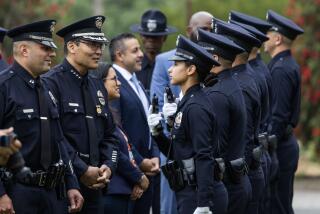Study of Police Staffing Endorsed : Personnel: But there is disagreement over how many officers in desk jobs can be replaced by civilians and returned to the streets.
Key police and city officials said Thursday they welcome an examination of the Los Angeles Police Department to determine how many able-bodied officers in desk jobs can be replaced by civilians and returned to the streets.
Representatives of the police chief, police union, Police Commission and the city administrative officer said they have no problems with the study proposed by Councilman Michael Woo.
However, they disagreed about how many officers should be returned to the field.
The police chief’s representative speculated that there would be only a few while the Police Commission’s representative suggested there would be many. Woo urged a goal of returning 400 officers to the field within 18 months.
Woo introduced his call for re-examining police staffing after a Times article Jan. 19 reported that the 8,200-member department assigns more than 400 officers to jobs that city auditors and even some people within the police force contend do not require police skills and powers.
“With the crime wave that’s hit this city, we can’t afford to have experienced police officers running a sports league, teaching Spanish or videotaping the chief’s news conferences,” Woo said Thursday, citing examples from the article. “Those officers ought to be where they’re needed--out on the streets keeping our people safe.”
Woo spoke at a hearing of his Government Efficiency Committee on a motion to instruct the Police Commission to develop a plan within 90 days to place civilians in all jobs that do not require police powers or skills.
The motion also calls upon the commission to estimate how much it would cost to hire civilians to replace able-bodied officers in desk jobs and retrain the officers for field duties.
The motion, which has also been referred for study to the Public Safety Committee headed by Councilman Marvin Braude, was approved by the efficiency committee on Thursday. Woo said he expects the full council to consider the motion soon. Braude could not be reached for comment.
Assistant Chief David Dotson, speaking on behalf of Police Chief Daryl F. Gates, said the Police Department has been a national leader in employing civilians in jobs such as jailers.
“What the chief has sent me here to say is that we are pledged to continue the civilianization process to the greatest degree we can,” Dotson said. “We welcome study from the city administrative officer, from this committee and from anyone else.”
City Administrative Officer Keith Comrie told the committee that the department, which employs 2,600 civilians, has historically resisted hiring civilians and resistance continues.
Comrie noted that his office in 1981 identified 256 jobs that could be done by civilians. He said the department, mayor and council decided to fill half of them with civilians. Citing the Times article, he said there is still more to do. A motion to ask the Police Commission to take a new look is “totally appropriate,” he said.
Police Commissioner Jesse A. Brewer, a former LAPD assistant chief, said the commission has begun an informal inquiry into deployment. “I’m sure we can civilianize many positions,” he said.
Officer Danny Staggs, a director of the Los Angeles Police Protective League, said the league does not oppose Woo’s motion “on its surface.” However, he cautioned officials against eliminating desk positions for officers who are restricted to light duties because of injuries or illnesses.
Dotson, the chief’s representative, said there are many jobs that civilians could do, but are better done by officers.
He said officers do a better job of teaching Spanish because they know from experience how the officers will need to use the language in questioning witnesses.
Dotson predicted that the re-examination would show relatively few jobs in which it would be wise to replace officers with civilians.
Councilman Mike Hernandez amended Woo’s motion to include an instruction for the Police Commission to study whether officers are deployed equitably among rich and poor areas.
More to Read
Sign up for Essential California
The most important California stories and recommendations in your inbox every morning.
You may occasionally receive promotional content from the Los Angeles Times.










